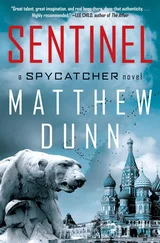‘Near Knoxville. Where they develop the supercomputers?’
‘They do many things there. Supercomputing is one of them. Another is cyber security. The United States is facing a lot of threats. We have a lot of defensive programs running. And the Russians have an agent in place who’s attempting to steal a copy of the most critical one. Its official name is project C02WW06BHH21.’
‘Snappy name.’
‘Only the geeks call it that. Everyone else calls it The Sentinel.’
‘What does it do?’
‘It protects the integrity of the election system software in forty-eight states. It’s the only thing that does.’
‘Why not all fifty?’
‘Politics. I haven’t got time to go into it.’
‘And the Russians are trying to steal a copy. So what? If they succeed what could they do with it? Change the result of an election? Aren’t there fail-safes? Paper backups?’
‘In some places. But changing the result is not their goal. That’s too direct. This is the Russians we’re talking about. You’ve got to understand just how long a game these people play. Their philosophy is if you hit a man with a fire hose he goes down, but he can get up again. If you gather enough raindrops and use them in the right way you wind up with the Grand Canyon. They’re trying to carve gaps in society that are too big to bridge. It’s all part of a bigger campaign. To sow discord and division. It’s been running for years. On social media. Conspiracy theories. Attempts to undermine the mainstream media.’
‘Fake news? I’ve heard about that.’
‘This time they’re specifically trying to erode faith in the election system itself. We know they’re serious. They already had a dry run four years ago, in Kentucky. What happened was, on election day, they sent out a phishing email. You know what that is?’
‘No idea,’ Reacher said.
‘It’s an email that looks legitimate, like it’s from some official trusted source. Like a bank or an insurance company.’
‘People trust banks and insurance companies?’
‘Some do. Anyway, the messages look genuine and they generally have a subject that sounds tempting in some way. Or urgent. Like half-price car insurance if you apply within twelve hours.’
‘So gullible people open these messages and something bad happens? Like an old-school letter bomb.’
‘Right. Opening the message or following a link or downloading an attachment, one way or another it infects the computer. A malicious program gets in and gains access to your files and passwords, and if you’re on a network it gets into that too. In the Kentucky case the Russians sent an email to all the election officials purporting to be from the VP of technical support at the company that supplied the election software. The subject line said it contained a critical update to the operating instructions.’
‘I can see how people could fall for that.’
‘They shouldn’t. They’re specifically trained not to. But trained or not, the email went to two hundred people. Six of them opened it.’
‘So the Russians got access?’
‘Yes.’
‘What did they do?’
‘Nothing. That time. They were proving the concept. Laying the foundations. Building up to a wider-scale attack this year. Imagine the scenes on election day if every person who shows up to vote at the correct precinct is told they’ve been re-registered without their knowledge at some other precinct on the other side of town. Or that their registration’s been cancelled altogether. Or when the results are announced it turns out that in some marginal districts Mickey Mouse and Daffy Duck are registered. Or that a bunch of people are registered in multiple precincts, even if they didn’t know it at the time or act on it.’
‘There’d be chaos.’
‘Total chaos. Only The Sentinel can stop it.’
‘It didn’t stop their dry run.’
‘It didn’t exist then. That’s why it was developed.’
‘Are you sure it works? This is the Russians we’re talking about. Maybe they’ve already penetrated some local elections and are just pretending they want to steal it to make you think they’re frightened of it.’
Fisher shook her head. ‘No. We know The Sentinel works. It’s already stopped twelve attempts in six different states. Plus we have a source who’s confirmed the Russians don’t believe they can defeat it. They weren’t too worried because they have an agent in place to steal it. Then panic set in because a record of some kind surfaced here that could lead to his exposure.’
‘I heard the town archive burned down.’
‘It did. The Russians did that. They’re also behind the ransomware attack that cost Rutherford his job. Evidently they wanted to shut down the new digital archive before it could go online.’
‘The town’s going to pay to get it unlocked. It had insurance. Why not wait until it’s up and running again, and go through it with a fine-tooth comb?’
‘The town might pay, but that archive is never going to see the light of day. I guarantee you that. Not all of it, anyway. Not the part we need.’
‘Rutherford figured out that some system he built might have captured the identity of whoever ran the ransomware attack. He thought that’s what someone wanted to get from him.’
‘Not possible. We know it was the Russians. The Russians know we know. And they want us to know, frankly. Every successful attack is them giving us the finger.’
‘I spoke to a guy yesterday at the courthouse. He said he was an agent with Homeland Security. Infrastructure Protection. He had a theory that Rutherford had colluded with the attacker.’
‘Agent Wallwork? He’s my partner. Sorry for the deception. We were hoping Rutherford might have somehow revealed what the item is. Or where it is. No. The panic’s about whatever can unmask their agent. That’s definite.’
‘In that case, how much do you know about a guy named Henry Klostermann?’
‘Who lives at the so-called Spy House? Don’t even think of going there. It’s such an obvious coincidence but we checked it out anyway. Those original guys from the fifties weren’t KGB agents. Just misguided citizens giving secrets to people they thought were their friends. They did some serious damage when they were in Los Alamos but nothing at all while they were here. They moved on after two years and defected soon after because they felt the noose beginning to close. They’re both dead now. They never married. They had no illegitimate offspring. No cousins. No other family that we know of. And they weren’t members of any parties or groups that might be looking to carry on their work.’
‘So there’s no connection to Klostermann other than the address?’
‘No. None. Why?’
‘I met him this morning. I think he’s looking for the same thing you are.’
‘You know what the thing is?’
‘Possibly. A computer thing. A server. It has a preliminary copy of part of the town archive on it.’
‘Jesus Christ. Why didn’t you say so before?’
‘I didn’t know about the agent and The Sentinel before. Klostermann said he wanted it for a different reason.’
‘What reason?’
‘Some family tree project, he claimed. It didn’t quite ring true. I think he’s trying to hide something.’
‘How does he know about this server?’
‘He said he hired Toni Garza, the journalist who was murdered, to dig up some property records going back to when his father immigrated. She found out that when the town started putting the archive on the computer they were using this server. It turned out to be too small so they switched it for a larger one, and Rutherford as IT manager took it back into stock for some future use.’
‘When did Garza start working for Klostermann?’
Читать дальше












